 |
|
The School of Medicine's 1998-99 Teaching Awards
Full-time faculty members in the tenure and clinician-educator tracks
are eligible for these awards. Nominations are solicited from the faculty,
housestaff and students. Dossiers are reviewed by the Faculty Teaching Awards
Committee which determines the recipients.
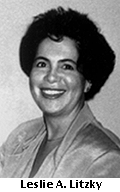 |
The Leonard Berwick Memorial
Teaching Award, established in 1980-81 by the Berwick family
and the Department of Pathology, recognizes a member of the medical faculty
who in his or her teaching most effectively fuses basic science and clinical
medicine. It goes to two distinguished faculty members this year, the second
of them honored posthumously:
Leslie A. Litzky, M.D., is an assistant professor of pathology
and laboratory medicine who served as director for the former Pathology
200 course from 1994-1998 while simultaneously acting as the pathology coordinator
during the development of Curriculum 2000. Her lectures and laboratory sessions
cover a wide range of topics within pulmonary pathology. She has considerable
expertise regarding the surgical and medical management of lung disease
and her lectures are informed by an awareness of the clinical issues and
implications surrounding pathologic diagnoses. Her sessions not only cover
basic pathologic concepts, but are also clinically important and useful
exercises. Students praise her direct and outgoing personality and her unusual
ability to make difficult concepts clear. She is a highly committed and
accomplished educator, who is able to communicate an almost infectious zeal
for her work-and a role model in her approach to undergraduate medical education. |
 |
Kevin E. Salhany, M.D. (9/30/57-10/15/98) was a 1978 graduate
of Tennessee's Southern Missionary College who received his M.D. at Loma
Linda University in California. After residencies and fellowships at Vanderbilt
University, he joined Penn Med in 1991 as an assistant professor. As a member
of the surgical pathology and hematopathology services and of the Penn Cancer
Center, he published widely and served as a consultant to regional pathologists,
hematologists and oncologists outside Penn. Within the University he worked
with the hematology-oncology group and also with individuals in surgery,
thoracic surgery and otorhinolaryngology in the evaluation of lymphoid proliferations
in various organ systems. His personal research interests included studies
of cutaneous and other lymphomas, focusing on T-cell proliferations. "In
his strong Tennessee accent," a close friend and colleague recalls,
"he would methodically assess a case and walk his students and residents
through its complexities to an understanding of the diagnosis. He was always
available for a consult with a colleague and he was dedicated to the service
of his patients. He had a gentlemanly sense of fairness and honesty that
made him very special. Kevin took his role as teacher to heart, and is remembered
by the medical students for his excellent teaching along with his responsiveness
to their needs, particularly during the recent integration of pathology
with the Curriculum 2000 initiative. His students, residents and fellows,
and colleagues remember and honor him as a remarkable physician, teacher,
mentor, and friend. We will never forget him." |
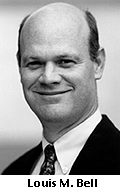 |
1999 Blockley-Osler Award: Created in
1987 by the Blockley Section of the Philadelphia College of Physicians,
it is presented annually to a member of the faculty at an affiliated hospital
for excellence in teaching modern clinical medicine in the bedside tradition
of William Osler. This year it is given to Louis M. Bell, M.D., associate
professor of pediatrics in infectious diseases and emergency medicine at
CHOP. An attending physician at CHOP since completing a fellowship in pediatric
infectious diseases there in 1986, Dr. Bell considers medical education
to be one of the most important missions of academic medicine. |
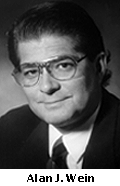 |
The Robert Dunning Dripps Memorial Award,
established in 1983 by the Department of Anesthesia, recognizes a faculty
member who exemplifies excellence in the education of residents and fellows
in the areas of clinical care, research, teaching and/or administration.
This year it is presented to Alan J. Wein, M.D., professor and chair
of urology at HUP.
Dr. Wein holds a Princeton A.B., cum laude, in biology. He took
his M.D. from Penn, and completed his surgery, basic science research and
urology training here before serving as a major in the U.S. Army in 1972-74.
He returned to Penn as an assistant professor and moved through the ranks
to full professor, chair of urology and chief of urology at HUP. His clinical
expertise is primarily in urologic cancer, and he has long been recognized
as one whose "extraordinary genius, vision, tenacity, compassion and
entrepreneurial spirit restore[s] hope and normalcy to children and adults
with urologic abnormalities and dysfunction," as one of his many awards
put it.
His basic science contributions have been primarily in the physiology
and pharmacology of the lower urinary tract, in which field his laboratory
has been responsible for many important contributions, including much of
the original work on the autonomic receptor content of the lower urinary
tract and the implications of this for drug therapy of voiding dysfunction.
He is responsible for one of the most widely used classification systems
for voiding dysfunction. He was one of the two original urologists elected
to serve on the NIH-appointed national Kidney and Urologic Diseases Advisory
Board and was the Urology representative on the Urology/Gastroenterology
panel of the FDA from 1987 to 1990. In 1998 he co-chaired the World Health
Organization-sponsored First International Consultation on Incontinence.
Since 1974, Dr. Wein's research team has been responsible for achieving
over $9 million in extramural funding for the Division of Urology. He was
the principle investigator for Penn's NIH-sponsored Interstitial Cystitis
Database project and served as the Chairman of the NIH Steering Committee
for that project. He is the principle investigator for Penn's Interstitial
Cystitis Clinical Trials Group project. He recently finished a six-year
term with the Residency Review Committee for Urology of the ACGME (Accreditation
Council for Graduate Medical Education); he chaired the group in 1994-1996. |
 |
The Dean's Award for Excellence in Graduate Student
Training, established in 1992-93, goes this year to Patrick
J. Loll, Ph.D., assistant professor in the department of pharmacology.
Dr. Loll received an undergraduate degree in chemical engineering from the
Catholic University of America, and holds a Ph.D. in biophysics from the
Johns Hopkins University School of Medicine. He performed post-doctoral
research with Michael Garavito at the University of Chicago, and joined
the Penn faculty in 1995. Awards Dr. Loll has received include a Damon Runyon-Walter
Winchell Cancer Research Fund Post-doctoral Fellowship, the Bayer Young
Researchers' International Aspirin Award, and the Michael S. Brown Junior
Research Award. |
 |
The Dean's Award for Excellence in Clinical Teaching
at an Affiliated Hospital was established in 1987 to honor commitment
to medical education and excellence in clinical teaching by recognizing
outstanding faculty members from affiliated hospitals. Two distinguished
faculty members were chosen this year:
Laura F. McNicholas, M.D., Ph.D., is assistant professor of psychology
and associate director of the fellowship program in the Penn/VA Center on
Studies of Addiction. She joined the faculty in 1992 after completing her
psychiatry residency at Penn, as well as a fellowship in clinical research
in substance abuse. She became director of education for the Penn/VA Center
on Studies of Addiction and became co-Director of Psychiatry 105, now the
Substance Abuse section of Brain and Behavior in Module 2. She is also active
in teaching in other aspects of Brain and Behavior, as well as Psychiatry
200 and the Psychiatry Residency Program. As associate director of the Fellowship
Program in the Penn/VA Center on Studies of Addiction, she is in charge
of recruiting new fellows and the management of the fellowship program.
Her research interests include new pharmacotherapeutic approaches to the
treatment of opioid dependence and the treatment of benzodiazepine dependence. |
 |
James M. Steven, M.D., is associate professor of anesthesia.
After graduation from Columbia College and the University of Cincinnati
College of Medicine, Dr. Steven came to Philadelphia in 1981 for his pediatric
residency at CHOP. There he developed an interest in critical care and enrolled
in the Anesthesia residency at HUP. He returned to CHOP in 1986 to complete
fellowships in pediatric anesthesiology, pediatric critical care medicine
and pediatric cardiac anesthesiology. Since 1987, when he joined the Department
of Anesthesiology and Critical Care Medicine at CHOP as well as the faculty
of PennMed, he has participated in the education of medical students, graduate
medical trainees and medical faculty, as well as nurses and other related
professionals. Dr. Steven has said of teaching, "Perhaps the greatest
fulfillment, resides in the knowledge that teaching future clinicians will
influence the care of far more patients than we might ever treat ourselves;
....training prospective teachers and scientists may truly exert an impact
on multitudes." |
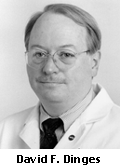 |
The Dean's Award for Excellence in Basic Science
Teaching was established in 1987, and honors exemplary teaching
and commitment to medical education specifically in the basic sciences.
David F. Dinges, Ph.D., professor of psychology in psychiatry, is
the recipient of this year's award. He is chief of the division of sleep
and chronobiology, and director of the Unit for Experimental Psychiatry,
in the Department of Psychiatry at Penn's School of Medicine, and a member
of the Graduate Group in Psychology in the School of Arts and Sciences.
Dr. Dinges came to PennMed as a postdoctoral fellow in 1977 to work in the
laboratory of Dr. Martin T. Orne, now emeritus professor of psychiatry.
He has been a member of the faculty since 1980. He lectures annually to
the medical students, and was cited for excellence in teaching by the class
of 1999. He also teaches a popular annual course on Sleep and Chronobiology
in the Biological Basis of Behavior Program, and has trained over 300 undergraduates,
graduate students, medical students and post-doctoral fellows in his laboratory. |
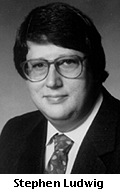 |
The Special Dean's Award for Excellence,
established during the 1989-90 academic year, honors special achievements
by Penn faculty members, particularly in the development of new and innovative
educational programs. The Vice Dean for Education, in consultation with
the Teaching Awards Selection Committee, identifies faculty members who
have made unique contributions to medical education at Penn during the previous
year. Two distinguished faculty members are being honored this year:
Stephen Ludwig, M.D., is professor and associate chair for medical
education in the Department of Pediatrics. He came to Penn in 1974 and has
worked in pediatric emergency medicine, general pediatrics and child abuse,
and throughout his career has been a strong advocate and teacher of students
and housestaff. In 1998 he was elected to the Institute of Medicine for
his efforts in developing the specialty of Pediatric Emergency Medicine.
Dr. Ludwig has been the course director for three medical school courses
and has served on the Curriculum Committee, Admissions Committee, Dean's
Letter Committee, and the education subcommittee of the Committee on Appointments
and Promotions. He is currently the Co-Chair of the Student Standard Committee.
Dr. Ludwig has been recognized by the CHOP housestaff with their Faculty
Teacher of the Year Award. He has also won the Christian R. & Mary E.
Lindback Award (1998) and the R. Dunning Dripps Award. In 1998 the Board
of Trustees of CHOP awarded him the John H. and Hortense Cassell Jensen
Chair in Pediatric Development and Teaching. Dr. Ludwig describes his most
important professional accomplishments as having taught others about the
honor and joy that comes from caring for children and having guided many
young physicians in their careers. |
 |
Emma Meagher, M.D., is director of the Patient Oriented Research
Training Program and the associate director of both the Center for the Treatment
of Complex Hypertension and the Cardiovascular Risk Intervention Program.
She graduated cum laude from the Royal College of Surgeons in Ireland, and
in 1994, after completing her residency and fellowship training, she moved
to the U.S. to take up a faculty position as an assistant professor, clinician-educator,
in the Department of Medicine at Penn. Dr. Meagher initiated the development
of PennMed's Patient Oriented Research Training Program, launched in the
fall of 1997. The objective of this program is to introduce clinical fellows
to the basic principles that underlie clinical research including biostatistical,
ethical and translational aspects of this endeavor. Dr. Meagher has harnessed
the collaboration of leading physician-scientists in the institution together
with the directors of the programs in clinical epidemiology and biostatistics
and bioethics. Additionally, she is the academic coordinator on a recent
submission for a NIH K30 grant to support the development and implementation
of a new Masters Degree Course in Clinical Investigation. Her clinical practice
is in the area of cardiovascular risk intervention and the management of
hypertension. Her research interests include mechanisms of vascular dysfunction
in cardiovascular disease; alcohol induced liver and cardiovascular disease,
and the role of antioxidant vitamin therapy in health maintenance and disease
prevention. Dr. Meagher is also integrally involved in undergraduate and
postgraduate medical education of pharmacology and therapeutics. |
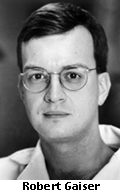 |
Medical Student Government Awards.
The graduating class selects annual recipients of two awards.
Clinical Medicine Teaching Award
Robert Gaiser,M.D., who is also a 1999 Lindback Award winner,
is an assistant professor of anesthesia, who came to the department of anesthesia
in 1992 as a fellow in obstetrical anesthesia, and joined the faculty in
1993. He has a B.S.E. from SEAS and an M.D. from Columbia University. He
was named Teacher of the Year in Anesthesia twice and also received the
Penn Pearls Teaching Award and in 1997 he received the Robert Dripps Memorial
Teaching Award of PennMed. He has developed two significant resident teaching
programs during his tenure, and has made a significant impact on his trainees. |
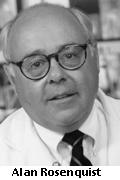 |
Basic Science Teaching Award
Alan C. Rosenquist, Ph.D., took his doctorate from Princeton in
1968, and joined the Penn faculty after a two-year postdoctoral fellowship
at the Institute of Neurological Sciences here. He is now professor of neuroscience
and associate dean for basic science education in the Medical School. He
served as Chairman of the Curriculum and Academic Review Committees of the
Neuroscience Graduate Group and remains active in graduate student education.
The recipient of a number of teaching awards and honors, and a seasoned
member of NSF review panels and NIH study sections, he is currently involved
in developing and implementing the Medical School's new four-year Curriculum
2000. Meanwhile, he is course director for the Brain and Behavior Organ
System Block. His research focuses on the neural mechanisms underlying recovery
of function after brain injury, and he is as associate editor for the journal
Cerebral Cortex. He is interested particularly in the interface between
the basic and clinical neurosciences, teaching a Neuroscience Review Course
for the housestaff in Neurology. He also serves as an officer of the Council
on Accreditation of the Association for the Assessment and Accreditation
of Laboratory Animal Care, which reviews and accredits institutions worldwide. |
Almanac, Vol. 45, No. 29, April 20, 1999
FRONT
PAGE | CONTENTS
| JOB-OPS
| CRIMESTATS
| OF RECORD: Campus Safety and Security:
A Shared Responsibility | TALK ABOUT
TEACHING | BETWEEN
ISSUES | APRIL at PENN
|
|
|












